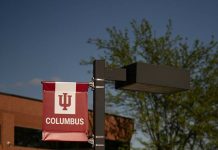There are no guarantees that a school shooting similar to what occurred at a South Florida high school last week would be preventable in Columbus.
That’s what Bartholomew Consolidated School Corp. superintendent Jim Roberts told about 60 people who attended Monday’s weekly Third House legislative session in Columbus.
After audience member Chuck Doup advocated stronger security measures, such as those taken in Israeli schools, Roberts said he did not see that as a viable solution.
“Today, if every door at Columbus North High School was locked, it would have not stopped a person with an AR-15,” Roberts said. “We don’t have that immediate capability.”
[sc:text-divider text-divider-title=”Story continues below gallery” ]
An AR-15 is a military-style rifle with automatic-firing capabilities.
BCSC officials are working on strengthening trusting relationships among students and adults, reviewing and practicing safety procedures, addressing mental health issues, identifying potentially dangerous situations _ and then notifying the proper people, Roberts said.
“But the Parkland school had done the same thing with this student,” Roberts said. “Still, he came back with an AR-15.”
Roberts was referring to the Feb. 14 school shootings in Lakeland, Florida, which left 17 people dead, most of them students, and 14 wounded.
Some residents who attended the Third House session said they were there to increase pressure for gun-control measures in Indiana.
Jenny Heichelbech, a leader in the 250-member Bartholomew County Indivisible group, said gun control is a “sanctity-of-life issue.”
Military-grade weapons, such as the AR-15 used in Lakeland, have no justifiable civilian purpose, and can be obtained in Indiana without a waiting period for as little as $400, Heichelbech said.
In reply, State Sen. Greg Walker, R-Columbus, said he’s talked with hunters who disagree these types of weapons have no civilian use.
After reading a prepared statement, Heichelbech asked Walker and State Rep. Milo Smith whether they agree that rapidly-firing large magazine firearms contribute to the frequency of mass shootings in schools around the United States.
Smith said while it’s too late to introduce new legislation in the Indiana General Assembly this year, he promised to recommend that the matter be discussed in a summer study committee.
Although guns are one component, there are several contributing factors that leads to mass shootings that range from bad parenting and mental health to illegal drugs and poverty, Walker said.
Although Heichelbech agreed there may be one or multiple factors in any particular case, “the common denominator here is the equipment,” she said. “Nobody becomes a mass shooter without a mass-shooting gun.”
Walker’s voice softened as he told the audience how he spent the past few days thinking about what happened in Florida, as well as other recent mass shootings.
“I, too, am tired of hearing the stories and dealing with the cleanup,” Walker said. “Now, we have …”
At that moment, the senator paused for several seconds. His voice broke with emotion before he continued.
“… 17 funerals in Florida. Now, they are going to demolish the school building because of what occurred there. It’s a national disaster, that’s what it is.”
“And it can happen in Indiana because we have the same laws as Florida,” Heichelbech said.
Citing both the June 2016 Orlando, Florida nightclub shooting that killed 49 people and last October’s killing of 58 during a Las Vegas concert, Jan Lucas-Grimm told lawmakers that mass casualty shootings can happen anywhere.
“We can’t talk about locking down every institution or building,” Lucas-Grimm said. “It’s access to semi-automatic guns. Nobody needs one.”
Walker said aircraft and motorized vehicles can also be weapons of mass destruction, resulting in a negative response from some audience members.
The negative response was reaching a crescendo just as Smith and moderator Beth Booth Poor calmed the audience by calling for a moment of silence.
Citing the December 2012 Sandy Hook school shootings in Newtown, Connecticut, where 20 children between age 6 and age 7 were killed, audience member Lydi Davidson spoke in a loud voice as she accused the lawmakers of “dancing around the issue.”
“If 20 babies in Newtown wasn’t enough to get you moving and get something done about guns in this country, then shame on you,” Davidson said to Walker and Smith. “Are you getting money from the NRA? Stand up, be our elected officials — and do something.”
Neither Walker nor Smith responded directly to Davidson.
John Counceller, who is seeking Smith’s seat in the Indiana House, said Hoosiers should be aware that Indiana is one of only five states where family members can seek a court order to take guns away from a potentially dangerous relative.
Another legislative candidate — Steve Schoettmer of Elizabethtown — asked for and received assurances from Walker and Smith that the types of protections Counceller mentioned are not in danger of being rescinded.
After the forum ended, a number of residents asked Roberts about upcoming protests associated with the Lakeland shootings.
While organizers behind the Women’s March called for a 17-minute, nationwide walkout by teachers and students on March 14, that will take place while BCSC is on spring break, Roberts said.
The superintendent said he’s heard of no local plans regarding a day of walkouts, sit-ins and other events on school campuses April 20, the anniversary of the 1999 shootings at Columbine High School in Colorado. Those protests are being organized by the Network for Public Education, an advocacy organization for public schools.
When asked what the BCSC administration’s position will be if teachers and students participate April 20, Roberts said it’s too early to answer that question.
“We certainly respect the right of people to express their opinions and their views,” the superintendent said. “But we would need some time to try and figure out what that would mean from the school’s perspective.”
[sc:pullout-title pullout-title=”Third House schedule” ][sc:pullout-text-begin]
The final Third House legislative session will be held March 5, Columbus Area Chamber of Commerce President Cindy Frey announced this week.
The hour-long forums, which give residents a chance to express their concerns to their state lawmakers, begin at 7:30 a.m. each Monday at Mill Race Center, 900 Lindsey St.
[sc:pullout-text-end]




